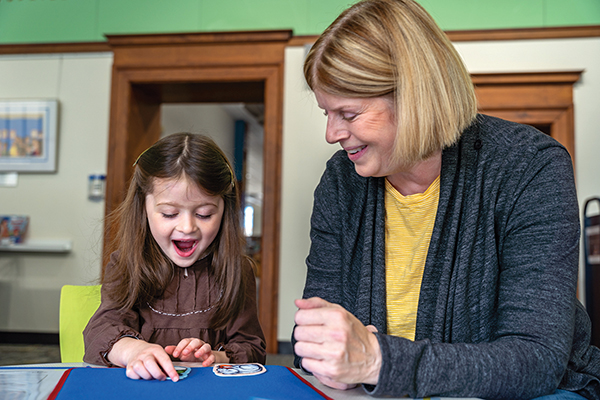
Getting ready to read
As children get a bit older, you can add more early reading skills to the time you spend together. Just as your child learned to crawl before they could walk, they need a solid base of words, letters, reading, and stories to get ready for the hard work of learning to read. You may not think of yourself as a teacher, but you will be teaching your child to read at this age by building a base of language and understanding.
Talk: Talking with children helps them learn new words and stimulates brain development which encourages learning.
Talking tips: Talk during morning routines, in the car, waiting in line, before a nap, during meals, doing household chores, at the store, out on a walk, during bath times, and before bedtime.
Ask your child questions like:
- “How many red things do we see?”
- “What do we see when we look up?”
- “How does taking a walk make us feel?”
- “What kinds of animals do we see right now?”
- “What kind of animals do you like?”
Sing: Singing, which also includes rhyming, increases children’s ability to hear different sounds within words and prepares them to sound out written words.
Things to sing about: Clean up, bath time, diaper changes, reading time, daily tasks, and classic nursery songs.
Nursery rhymes with singing and actions such as I’m a “Little Teapot,” “Head, Shoulders, Knees, and Toes,” and “The Itsy Bitsy Spider” can be shared any time during your day.
Play: Playing is one of the main ways young children learn about the world which helps children understand books and stories once they begin to read.
Things needed for play: A little space and simple props like large boxes, old clothes, empty food containers, and empty paper towel rolls. Using props helps spark your child’s imagination!
As your child plays, sit with them and ask questions:
- “Tell me about this building.”
- “What do you like about this?”
- “What happens next?”
Write: As soon as a child can grasp a crayon, they can begin scribbling which sets the stage for more advanced writing.
Things needed for writing: Pencils, crayons, markers, and scrap paper for your child to practice writing and drawing.
Have children trace dotted lines and shapes, use sidewalk chalk outside, make racetracks on a piece of paper for toy cars, let your child help with making a grocery list.
Read: Reading to and with little ones is important to help children become skilled, lifelong readers. You will be creating a reader with each word you share.
Reading to the youngest children: Have fun! Don’t make reading a chore or stressful. You don’t have to finish a book if your child is no longer interested in sitting still. Let your child choose the books they want to read – preschoolers start to have very strong opinions and are more likely to engage longer with books they have an interest in.
Individual training: The Library’s early reading specialists provide individual and group training to help you get your child ready to read. You will get a free kit with books and early literacy materials.
Call 419.259.5253 for help.
Storytimes: Storytimes are a great way to make getting ready to read fun and easy! Choose from a variety of age groups and locations. View storytimes.
Get a free Library card! Make sure you have lots of books for reading to your child. Your Library card allows you to check out unlimited books and we don’t charge fees if you return your books late. Get a card today.
Get free books sent to your house: Sign up today for Dolly Parton’s Imagination Library to have one free book per month sent to your home for all children under age five. Sign up for free books.
Let us get a stack of books for you. We can pick books for you! Tell us what topic you’d like and we’ll get a stack that you can pick up at your preferred location. Request books to read to your child.
Come play at the Library. All of our locations have play spaces just for children, including a huge children’s space at Main Library. These spaces are also a great place for you to get support from our librarians while meeting other parents and caregivers. Plan a trip today.

